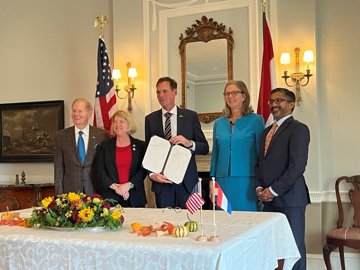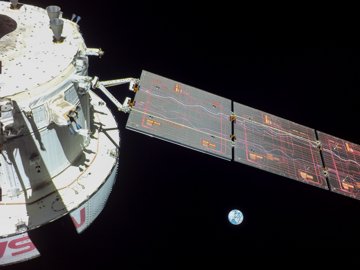The Netherlands signs NASA accords for good cooperation in space
The Netherlands joins the countries that endorse the values and principles in the Artemis Accords drawn up by NASA. Director of the Dutch space agency NSO, Harm van de Wetering, therefore put his signature to the document yesterday evening in Washington D.C., in the presence of NASA Administrator Bill Nelson and Dutch Ambassador Birgitta Tazelaar. "The Netherlands has been working with NASA on groundbreaking projects since the early days of space flight," van de Wetering said. "But pushing boundaries requires good international agreements. By signing the Artemis Accords, we commit ourselves to that."

NASA Administrator Bill Nelson, left, NASA Deputy Administrator Pam Melroy, Harm van de Wetering, director of the Netherlands Space Office, Ambassador of the Netherlands to the United States Birgitta Tazelaar, and Chiragh Parikh, executive secretary of the National Space Council
NASA Administrator Nelson: “As one of America’s oldest allies, NASA is proud to expand our partnership with the Netherlands and build a future defined by limitless opportunity and discovery.”
The Artemis Accords are an agreement between governments that participate directly or indirectly in the U.S.-led Artemis program. Among other things, this program deals with exploration of the moon and Mars, unmanned and later manned. By signing, the Netherlands endorses the principles of the accords, and provides the opportunity for the Dutch space sector to also contribute to future missions within the Artemis program.
The accords contain 10 principles, including in the areas of international cooperation in space exploration, sharing scientific data, granting rights for use of natural resources in space, and reducing space debris. These guidelines are also intended to prevent conflicts or misunderstandings between countries in the area of exploration activities.
According to Van de Wetering, in these shared principles lies the essence of the Artemis Accords, also for the Netherlands: "Developments in space, institutional and commercial, are moving at lightning speed and call for international agreements on responsible use of space. The Netherlands has always recognized the need to make agreements and therefore plays an active role in the development of policies, rules and regulations, both in the European context and at the United Nations."
The signing took place during a small ceremony at the ambassador's residence, in the presence of a delegation from NASA, the NSO and some representatives of the Dutch space sector. The visit of the Dutch delegation was also used to further explore possible new areas of cooperation between the Netherlands and NASA.

Solar panels from the Netherlands provide the enery supply for the Orion Capsule. (image: NASA/ESA)
Cooperation with NASA is already broad and diverse, going back a long way. For example, it was NASA that launched the first Dutch satellite ANS, exactly 50 years ago next year. Dutch researchers and engineers made important contributions to NASA missions such as the X-ray telescope Chandra, and the James Webb Space Telecope. Ties in the field of Earth observation are also strong and successes have been achieved. For example, the Dutch Ozone Monitoring Instrument (OMI) on the NASA satellite EOS Aura has been playing a crucial role in monitoring the ozone hole since its launch. And early next year NASA will launch the Earth observation satellite PACE with the Dutch-built instrument SpexOne on it, which should gain more knowledge about the influence of aerosols on climate change.
Through ESA, Dutch industry is already involved in the Artemis program. Dutch solar panels provide the energy supply for the Orion capsule that is to take people to the moon and back. Next year, the first manned flight within the Artemis program is planned.